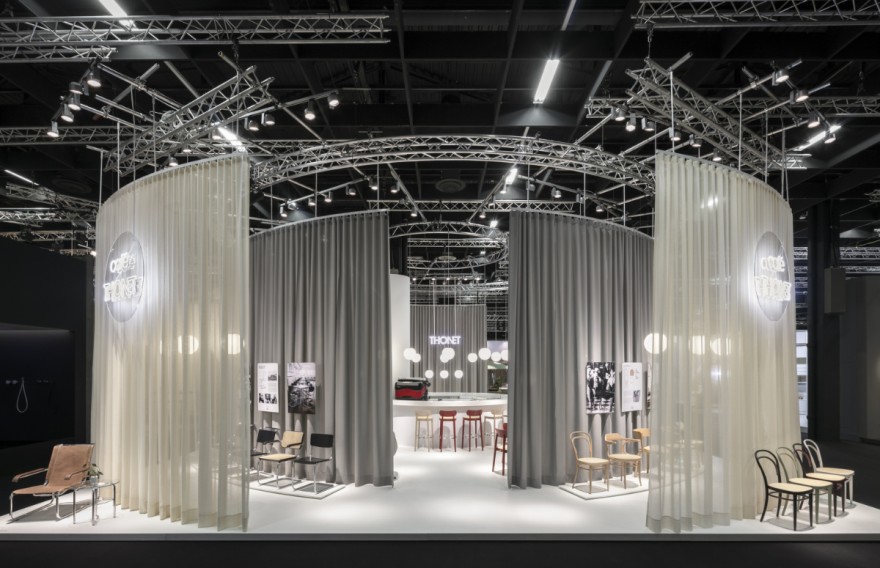Craftsmanship meets industrial production
A love for detail literally fills the air at Thonet. The company in Frankenberg, Hesse, has been producing design classics by means of traditional craftsmanship for more than 200 years, including the 214 coffee house chair. The importance of tradition at Thonet doesn’t just start with how things are produced. The company also pays attention to quality when it comes to its regional suppliers and meets the expectations of our times as a result.

It takes up to 147 single working steps until a chair is finished. Photo: Thonet
In this article
‘I have to feel the wood bend.’
When you enter the shop floor at Thonet, you can almost feel the traditional craftsmanship. It smells of wood and metal, people are hammering everywhere, there’s the sound of hissing and there’s steam in the air. The tables, chairs and armchairs manufactured here are still made by hand to a large extent. Because even if modern production technologies can now supplement traditional work, it isn’t possible without human input. The well-known 214 coffee house chair, which has become a design classic with its curves, is a prime example of this. In 34 years in the business at Frankenberg, wood technician Armin Ludwig has has given thousands of bentwood chairs their unmistakable shape.
Delicate forming

When bending solid wood, you have to have a delicate touch. Photo: Philipp Thonet
The process requires great care, well-practised hand movements and synchronised sequences. In order to be able to bend the solid beech and ash, it first has to be made elastic by being put into a steamer for several hours. Then, the wood is fixed in place in special moulds and dried. Teamwork is essential here. Sometimes four people have to bend the backrests of the 209 bentwood armchair together.
What is bentwood?
With his idea to form wood using steam and muscle power, Michael Thonet laid the foundation for modern furniture. In the 1830s, he experimented with veneer strips that were boiled in glue. Finally, he succeeded in developing ‘furniture made of solid bent wood’. Today, we refer to it as bentwood when solid bent wood is used in furniture production.
Making metal vibrate

Tubular-steel production at Thonet
The production of furniture made of tubular steel also requires know-how about the materials and the production process. For icons like the S 64 cantilever chair by Marcel Breuer from the Bauhaus period, for example, a special alloy of a spring-tempered tubular steel is needed. This is the only way to guarantee dimensional accuracy and material strength – a prerequisite for ensuring that the oscillation effect is maintained over a long period of time and does not wear out over the years.
After being cut to length (trimmed), the tubes are first deburred, meaning that they are freed from splinters and sharp edges, and then ground. The bending process then takes place with the highest level of precision using a semi-automatic machine (CNC machine). If necessary, the mould is then adjusted again by hand, ground again and polished.
For environmental reasons, the surface finish is carried out in specially qualified companies. At the end, the furniture is returned to the company’s own shop floor, where the upholstery and the various wood, leather, mesh or wickerwork trimmings are fitted.

Thonet marked its 200th anniversary as a company with an exciting booth concept at imm cologne 2019, 65 years after its first appearance at the trade fair. Photo: Thonet
Tradition that meets the trend
With its short supply chains, Thonet catches the current zeitgeist perfectly. Trends such as deglobalisation and glocalisation ensure more demand for mindfully produced products. The coronavirus pandemic has clearly revealed a further advantage: economic independence. Global incidents can cause the globalised economy to falter if the transport of goods is restricted. With its choice to use well-established, local contacts, Thonet has not been affected in this respect.
Thonet treasures its long and close connection to both its suppliers and imm cologne, too. The traditional company has been a regular at our trade fair since 1954.




